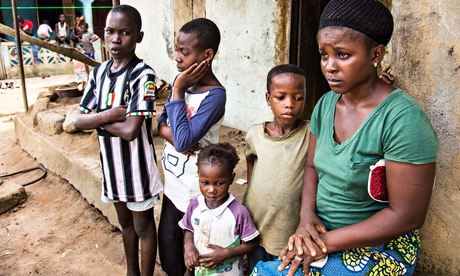
Tentatively, three young teenagers approach. They have expressionless, hollow eyes. The tallest, a boy, offers a small smile. The two girls barely muster a greeting.
They sit tightly together on a bench in the dust. Asked how his parents died, Ibrahim, 16, says “nobody has told us”. “My mother just passed away. I don’t get any information about her. She died on 24 August.”
His mother was three to four months pregnant when she died from Ebola. The prognosis for pregnant women with the disease is poor. Few survive. “She miscarried. The ambulance came. They discharged her, but unfortunately she was not able to survive,” he says. “My father died seven days after the funeral.” Asked if they had died of Ebola, he replies: “We don’t know the right information.”
The British charity Street Child was alerted about the Sesay family – who live in a satellite district of Sierra Leone’s capital, Freetown – by neighbours, just days earlier. Kelfa Kargbo, the charity’s country director, says it is likely they do not want to utter the word Ebola because of the stigmatisation.
For two months, the Sesay children – Ibrahim and his sisters Sawudatu, 14, and Kadiatu, 13 – have been left to fend for themselves while burdened with grief. Aunts and uncles have also died. An uncle, who they say lives far away, is the only adult survivor in their extended family.
They are typical of the 2,000 orphans with whom the charity is in contact, or knows about, who have been left to their own devices. The Ebola response is so focused on containment of the disease that there is no team of officials working in the slipstream of the burial teams to register orphaned dependents.

The country’s ministry of social welfare, gender and children’s affairs puts the number of orphans in Sierra Leone at 2,600, but organisations including Unicef believe the real figure could be more than 7,000.
Asked how they have fed themselves in the past two months, Ibrahim, whose first language is not English, wells up: “We are just fighting for us to have our survival.” Pointing to an open fire in the dust, he says he has been making clay cooking pots and selling them to a passing trader for 2,000 leones (30p). But he should be in school.
His father traded coal and wood. His mother “fought a lot so they could stay in school”. His biggest worry is how they will pay for their education. He wants to be a lawyer. Sawudatu likes maths and athletics, while Kadiatu likes maths and social studies.
Ibrahim is concerned he won’t be able to earn enough for the three of them to finish their secondary education, which typically in Sierra Leone finishes when a student is in their 20s. “The paramount help is a nice schooling programme, and food and clothing,” he says. In present circumstances, that will be a challenge.
The trio live on a former camp for Liberian refugees in a four-room house. The mud walls are bare apart from two religious posters and a clock with no hands. A few clothes hang on a door; pots, a kettle and a pair of flip-flops lie on the floor. There is no electricity, no water, no toilet and no kitchen. Neither are there books, music or toys.
Ibrahim unlocks the door to his parents’ room, which appears untouched since their death. A mattress lies on the floor. Clothes are draped from a line hanging above.

Community support
A few miles away in the village of Morambie, a family of five Ebola orphans face the same grief.
The eldest is 20-year-old Zainab Kamara, the youngest is five-year-old Sailay, for whom she cares, along with 13-year-old twin brothers and an eight-year-old brother. They too have been missed by the system being put in place for orphans.
“When our parents died, we had nothing, we had no food at all,” said Zainab. “Nobody gave us anything. No money, no food,” she replies.
What did the burial team say? “Nothing.” Did they say they would come to help you? “No.” Did anyone ask if there were children in the house? “No”. And anyone from the government? “No.”
This is common in Freetown, where the 117 Ebola hotline gets frequent calls about children left behind after highly contagious corpses are removed by the burial teams, whose only priority is to lock down infection.
The Kamaras can count on the support of what appears to be a tight-knit community working through its collective grief over Ebola.

Since the virus first struck Morambie in August, it has killed 67 people, leaving 25 orphans.
“Right now, there is a corpse in there,” says Uma Kamara, the village leader, gesturing to a house just feet away. Three children under 10 are dead, and their father. “Every day here there’s a funeral.”
Ebola arrived after a villager returned from a funeral of “a prominent man” elsewhere. People had washed the corpse as part of a traditional burial. The man brought Ebola to Morambie. In one house, 23 of 29 people died including the mother and seven of eight children, says Kamara.
A similarly ill-judged decision to honour the dead was made two hours away in a village near the town of Makeni where 103 people died after the community decided to disinter the corpse of the village chief and give him a ritual burial. This is outlawed under the country’s state of emergency.
How will Morambie overcome the trauma? “They cry, cry, there is a lot of sorrow. It will not be quick, the sorrow multiplies on a daily basis,” says Kamara. “It is worse than the war.”
